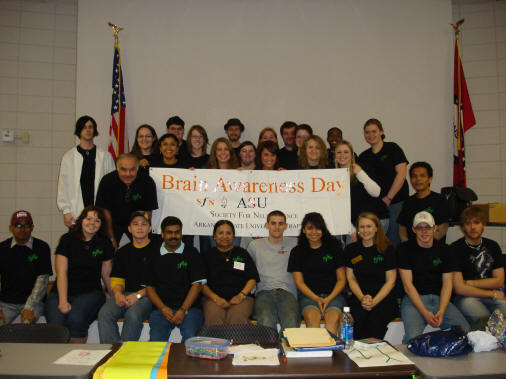University
Communications
Office
Arkansas State University
Jonesboro,
Arkansas
Staff
Markham Howe
Sara McNeil
Gina Bowman
(870) 972-3056
fax (870) 972-3693
More information:
NewsPage
Links to News Releases
& Announcements
Campus Calendar
Public activities at ASU
About
ASU
Overview, history
and more |
ASU's
Society for Neuroscience presents 5th annual Brain Awareness Day, April
11
April 8, 2009 --
The ASU
Society for Neuroscience will celebrate the 5th annual Brain
Awareness Day in the Round Room of the Craighead County Jonesboro Public
Library, 315 W. Oak, on Saturday, April 11, from 11a.m. to 3 p.m.
Dr. Shivan Haran, Dr. Amy Pearce, and Dr. Malathi Srivatsan will offer
demonstrations and provide displays to help explain brain function,
joined by members of ASU’s student chapter of the Society for
Neuroscience. The event is free and open to the public, and door prizes
will be awarded.
According to the event organizers, it will be a kid-friendly, fun, and
informative event for the entire family, illustrating how our senses and
brain functions work together in our everyday life.
Attendees can participate in more than 20 different activity stations,
such as making brains and nerve cells out of modeling materials, testing
reaction time, and more. Popular local entertainer Chippy Kazoo will
again be on hand to offer juggling lessons to participants. Dr. Shivan
Haran will bring robots, as well.
In a recent article in The Jonesboro Sun, Dr. Amy Pearce and Dr. Malathi
Srivatsan have written, "The brain is our most important and complex
organ. Like all of our organs, it needs to be looked after to stay
healthy. But how do we keep our brains fit?"
They continue, "Find out more by attending for the Fifth Annual
Brain Awareness Day, the event for exciting, stimulating and educational
activities designed to challenge your brain, improve brain fitness and
explain how brains work." The complete text of the article follows
below:
"Brain Awareness Day will be held in the Round
Room of the Craighead County Jonesboro Public Library on Saturday, April
11, from 11 a.m.-3 p.m. All ages are welcome, and this event is free and
open to the public.
Many studies tout mental gymnastics, a form of
cognitive fitness training. Examples include playing chess or
challenging video games, solving riddles, or learning a foreign
language, among many others.
Such forms of mental stimulation can improve
cognitive performance, but critics contend that the effects seem to be
very task-specific. That is, the trained tasks benefit from practice,
but the benefits may not transfer very well to other tasks in which one
is not trained. In other words, the more you play Scrabble, the better
you are at Scrabble, but not at Sudoku.
We have known for some time that physical
exercise is good for our hearts and lungs, helps in weight management
and in improving sleep and mood. Several new studies confirm that
physical exercise is also good for our brain. Physical exercise is
shown to increase the production of a growth factor, the brain-derived neurotrophic factor (BDNF) in the brain. This neurotrophic factor is
shown to slow down cell death that occurs in the brain with aging and in
Alzheimer’s disease. Further, BDNF is known to help reduce depression.
As we age, brain tissue shrinks in a pattern that
matches a decline in mental performance. The shrinkage is most obvious
in the outer covering of the brain known as the cortex. The cortex is
made up of two types of tissue called white and gray matter. The older
we get, the greater the decline in brain density in the white and gray
tissue. Yet, even in old age, any mental exercise that requires
learning and memory helps in growth and formation of new connections in
the brain. Thus, both physical exercise and greater brain fitness
actually slow this age associated decline.
Both mental and physical exercises are needed to
maintain a healthy brain, so taking a multi-pronged approach seems best.
In studies where people participated in one of
four groups (aerobic training only, memory training only, combined
aerobic and memory training, or no training), results showed that memory
increased in all but the control group. However, the combined memory and
exercise training group showed the most improvement.
People who keep their minds challenged and bodies
fit can reduce the rate at which their brains shrink with age. Staying
mentally and physically active keeps the part of the brain involved in
memory, (known as the hippocampus), healthier for longer and improves
cognitive performance.
It is even believed that aerobic fitness
training, such as running, helps to create new brain cells, or neurons,
in the hippocampus and increases brain volume in the cortex. This may be
due to increases in the number of blood vessels and the formation of new
connections between neurons.
Challenging your neurons can even ward off
certain disorders such as dementia and Alzheimer’s disease and help in
managing depression and Parkinson’s disease.
The Arkansas State University Society for
Neuroscience encourages you to keep your brain sharp and healthy by
engaging in stimulating mental and physical activities and maintaining
curiosity throughout your lifetime."
(This article (#200) was written by Amy R. Pearce, an
associate professor of psychology, and Malathi Srivatsan, an associate
professor of biological sciences at Arkansas State University. For more
information contact Dr. Amy Pearce, 870-972-3282,
apearce@astate.edu, or Dr.
Malathi Srivatsan, 870-972-3082,
msrivatsan@astate.edu, at Arkansas State University. In order to
communicate its research to the public, ASU’s Department of Biological
Sciences has produced a series of articles about various aspects of
science, including research and opinions. The department shares faculty
with the Arkansas Biosciences Institute (ABI) at ASU. Contact the
department by telephone at (870) 972-3082, by e-mail at biology@astate.edu,
or see
http://biology.astate.edu/Outreach/outreach.htm for more
information.)
For more
information contact Dr. Amy R. Pearce
(apearce@astate.edu) or
Dr. Malathi Srivatsan
(msrivatsan@astate.edu).

Figure caption:
Members of the
Arkansas State University Society for Neuroscience welcome visitors to
the 2008 Brain Awareness Day. Photo by Denisce Warren.
###
|
